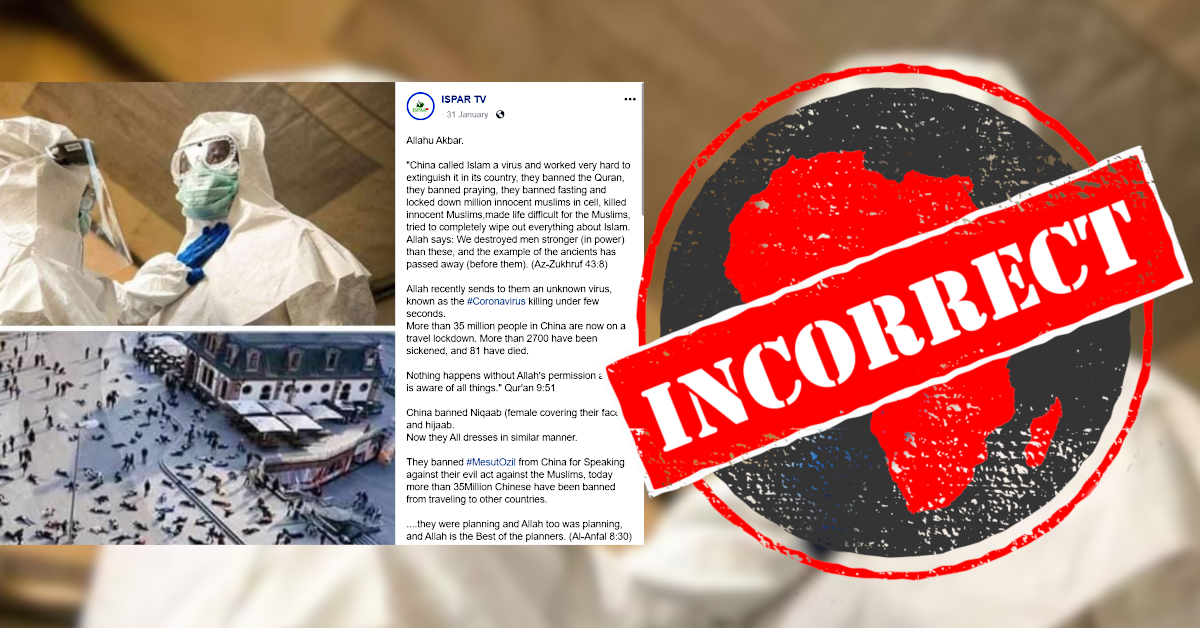A post on a Nigeria-based Facebook page claims the coronavirus is an “unknown virus” that kills in “under few seconds”, and is punishment for the Chinese government’s alleged clampdown on Muslims in the country.
It includes two photos. The first shows people in medical masks. The second is an aerial view of dozens of people lying on the street.
The post has been shared more than 1,300 times and discussed in nearly half a thousand comments.
But do the photos show events from the current outbreak of coronavirus in China? And is coronavirus an “unknown” virus that kills in just a few seconds?

Both photos are unrelated to the new coronavirus outbreak, which started in December 2019.
The first was taken in August 2018 and shows masked health workers in western Uganda, where there was a suspected case of Ebola.
The second photo dates back to March 2014. It shows a performance art project in Frankfurt, Germany, in which people lay down in a pedestrian zone in remembrance of the 528 victims of the Katzbach Nazi concentration camp.
And coronaviruses are not “unknown”. The World Health Organization defines them as “a large family of viruses that cause illness ranging from the common cold to more severe diseases such as Middle East Respiratory Syndrome (MERS-CoV) and Severe Acute Respiratory Syndrome (SARS-CoV)”.
According to the WHO, an outbreak of a new strain of coronavirus, technically known as 2019-nCoV, was first reported in the Chinese city of Wuhan on 31 December 2019. The new strain is commonly known as “novel coronavirus”.
The WHO’s 2 February 2020 update on the outbreak reports that 14,557 cases of novel coronavirus have been confirmed, most of them in China. There have been 304 deaths in China, and one in the Philippines.
And novel coronavirus doesn’t kill in seconds.
The WHO says “infection with 2019-nCoV can cause mild symptoms including a runny nose, sore throat, cough, and fever”. It can be more serious in some people, leading to pneumonia or breathing difficulties.
“More rarely, the disease can be fatal,” the organisation says. “Older people, and people with pre-existing medical conditions (such as diabetes and heart disease) appear to be more vulnerable to becoming severely ill with the virus.” – Allwell Okpi
It includes two photos. The first shows people in medical masks. The second is an aerial view of dozens of people lying on the street.
The post has been shared more than 1,300 times and discussed in nearly half a thousand comments.
But do the photos show events from the current outbreak of coronavirus in China? And is coronavirus an “unknown” virus that kills in just a few seconds?

Old photos, unrelated to coronavirus
Both photos are unrelated to the new coronavirus outbreak, which started in December 2019.
The first was taken in August 2018 and shows masked health workers in western Uganda, where there was a suspected case of Ebola.
The second photo dates back to March 2014. It shows a performance art project in Frankfurt, Germany, in which people lay down in a pedestrian zone in remembrance of the 528 victims of the Katzbach Nazi concentration camp.
Unknown virus that kills in seconds?
And coronaviruses are not “unknown”. The World Health Organization defines them as “a large family of viruses that cause illness ranging from the common cold to more severe diseases such as Middle East Respiratory Syndrome (MERS-CoV) and Severe Acute Respiratory Syndrome (SARS-CoV)”.
According to the WHO, an outbreak of a new strain of coronavirus, technically known as 2019-nCoV, was first reported in the Chinese city of Wuhan on 31 December 2019. The new strain is commonly known as “novel coronavirus”.
The WHO’s 2 February 2020 update on the outbreak reports that 14,557 cases of novel coronavirus have been confirmed, most of them in China. There have been 304 deaths in China, and one in the Philippines.
And novel coronavirus doesn’t kill in seconds.
The WHO says “infection with 2019-nCoV can cause mild symptoms including a runny nose, sore throat, cough, and fever”. It can be more serious in some people, leading to pneumonia or breathing difficulties.
“More rarely, the disease can be fatal,” the organisation says. “Older people, and people with pre-existing medical conditions (such as diabetes and heart disease) appear to be more vulnerable to becoming severely ill with the virus.” – Allwell Okpi
Republish our content for free
For publishers: what to do if your post is rated false
A fact-checker has rated your Facebook or Instagram post as “false”, “altered”, “partly false” or “missing context”. This could have serious consequences. What do you do?
Click on our guide for the steps you should follow.
Publishers guideAfrica Check teams up with Facebook
Africa Check is a partner in Meta's third-party fact-checking programme to help stop the spread of false information on social media.
The content we rate as “false” will be downgraded on Facebook and Instagram. This means fewer people will see it.
You can also help identify false information on Facebook. This guide explains how.





Add new comment